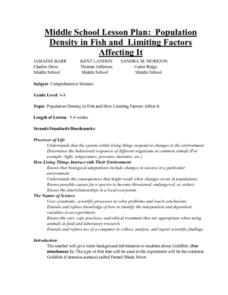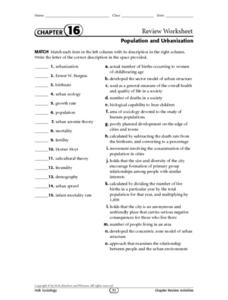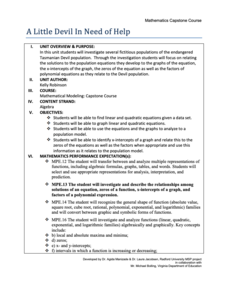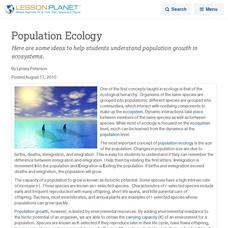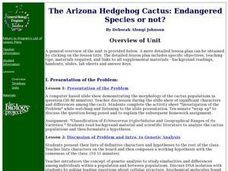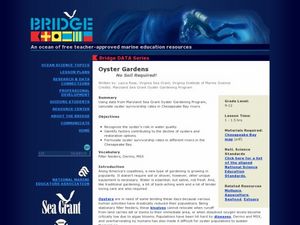It's About Time
Diversity in Living Things
How diverse is the world we live in compared to the way things used to be? Young biologists explore diverse organisms and relate the structure of each organism to its ability to survive in our current environmental conditions....
Curated OER
Some Similarities Between the Spread of an Infectious Disease and Population Growth
Students compare and contrast the spread of infectious diseases and population growth. In this biology lesson, students identify the exponential growth pattern of spreading diseases. They relate this to HIV infection and AIDS.
Curated OER
Human Population Growth in the Future, What are We Going to Do?
Students predict what will happen to human population in the future. In this biology lesson plan, students brainstorm possible solutions to overpopulation problems. They create a persuasive brochure about their views on this issue.
Curated OER
Populations – The Survival of the Fittest (Part 1)
Students explain in their own words why organisms live together. In this biology lesson plan, students model what happens to organisms if their environment changes. They explain the importance of evolution.
Curated OER
Human Populations Studies: the Ghost of Populations Past
High schoolers compile data on population distribution and develop survivorship curves using information from cemetery tombstones and obituaries. They develop inferences on the changes in population age distribution in their area over time.
Curated OER
Population Density In Fish
Students investigate how a population of fish multiplies in an ecosystem and the kinds of things that must be done to maintain a healthy population balance with other organisms that live there. They conduct an experiment to test the...
Curated OER
Population and Urbanization
In this population and urbanization worksheet, students match 15 terms with the appropriate descriptions and respond to 8 short answer questions regarding these sociological themes.
Curated OER
From Restriction Maps to Cladograms
Biology aces analyze restriction maps to determine the relationships among different primate species and then complete a cladogram. Preface this lesson with an explanation of how restriction enzymes are used to create the DNA maps....
Curated OER
Natural Selection
Biology learners tackle evolution-related concepts when viewing this collection of slides. There are no graphics or photos, just notes in bullet-point style detailing adaptations, evidence for evolution, mechanisms for change, and types...
Curated OER
Producing a Strain of E. coli that Glows in the Dark
Students observe the experimental process called bacterial transformation and demonstrate phenotype changes in bacteria that have been transformed with an antibiotic-resistance gene and a metabolic marker. They create a luminescent...
Serendip
Understanding and Predicting Changes in Population Size – Exponential and Logistic Population Growth Models vs. Complex Reality
Salmonella poisoning impacts over 200,000 people in the United States each year. Scholars learn about the growth of these bacteria using multiple approaches. Then they apply the same growth calculations to endangered species and think...
Radford University
A Little Devil In Need of Help
Math modeling to help endangered species? Scholars first investigate linear and exponential equations and graphs that model fictitious animal populations. They consider how key features of the graphs relate to the situation. As a final...
Howard Hughes Medical Institute
Measuring Biodiversity in Gorongosa
Take your biology class' understanding of biodiversity to a whole new level! Ecology scholars use data to calculate three different diversity indices based on the organisms in the Gorongosa National Park. The four-part activity uses an...
Curated OER
Analysis of Data
Students analyze DNA banding patterns for similarities and differences among individuals and between populations. They examine individual prepared gels then pool the class data to come to an overall conclusion.
Curated OER
Population - Technical Reading
Students analyze a technical article about population growth and present possible solutions.
Curated OER
Understanding Human Population Growth
You can help students learn about the causes and consequences of our rapidly growing global population
Curated OER
Population Ecology
Here are some ideas to help students understand population growth in ecosystems.
Curated OER
The Arizona Hedgehog Cactus: Endangered Species or not?: Biology, Plants
In this lesson students will study the: "Classification of Echinocereus triglochidiatus and Geographical Ranges of its Varieties." Students read background material and scientific literature to analyze the cactus populations and then...
Curated OER
Flower Population
For this flower population worksheet, high schoolers use a diagram of first and second generations of a flower population to complete 2 short answer questions about genotype and allelic frequency.
Curated OER
Oyster Gardens - No Soil Required!
Explore the practice of oyster gardening. Because oysters play a vital role in marine ecosystems and their populations have declined, biologists are transplanting oyster seed to repopulate reefs. After learning about this practice,...
Curated OER
The Influence of Human Activity on the Environment
The surge in human population in the last 2,000 years, due in large part to better health care, has brought a surge in the demand for resources and in pollution. The graphics, photographs, and real-life examples in a thought-provoking...
Curated OER
Wildlife
First, biology pupils research land and marine habitats along the route of skipper Rich Wilson's Great American II. Then, using colored paper clips scattered across a colored paper background, they play the predator-prey game to...
Curated OER
Biological Succession in a Microecosystem
Students investigate the concept of biological succession by simulating the process in a microenvironment with various microorganisms. By engaging in a lab, students determine the factors causing succession and learn population sampling...
Curated OER
Populations and Ecosystems
Sixth graders examine the factors that influence the stability of ecosystems. They construct a miniature ecosystem in a jar that includes plants, small fish, and snails, record the population changes over a period of four weeks, and...
Other popular searches
- Population Biology Predation
- Biology Population Ecology
- Global Population Biology
- Population Biology Marine
- Population Biology Lily Pad
- Biology Population Growth
- Biology Population Density
- Biology Population







